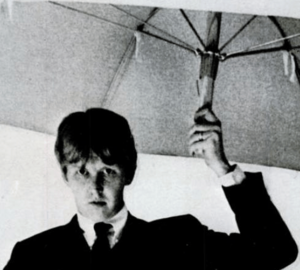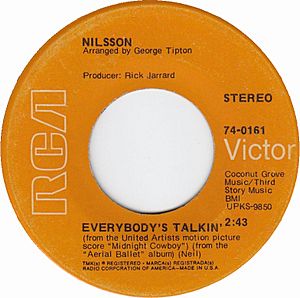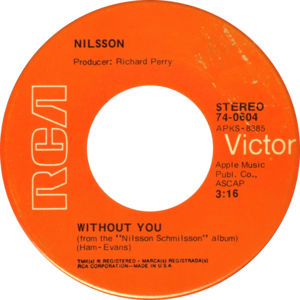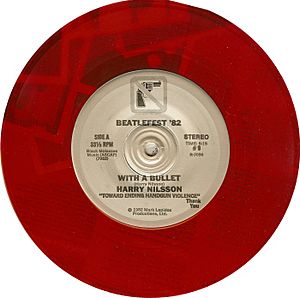Harry Nilsson facts for kids
Quick facts for kids Harry Nilsson |
|
|---|---|
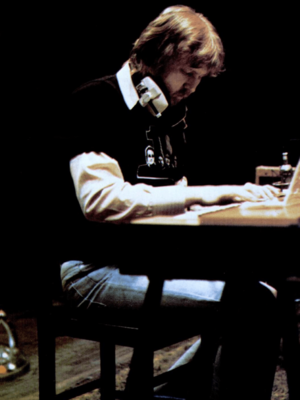
Nilsson in 1974
|
|
| Background information | |
| Birth name | Harry Edward Nilsson III |
| Also known as | Nilsson |
| Born | June 15, 1941 Brooklyn, New York, U.S. |
| Origin | Los Angeles, California, U.S. |
| Died | January 15, 1994 (aged 52) Agoura Hills, California, U.S. |
| Genres | Rock, pop |
| Occupation(s) | Singer-songwriter |
| Instruments |
|
| Years active | 1958–1992 |
| Labels | |
| Associated acts |
|
Harry Edward Nilsson III (born June 15, 1941 – died January 15, 1994), known as Nilsson, was an American singer and songwriter. He became very popular in the early 1970s. He was known for his unique vocal experiments, combining many layers of his voice. He also blended Caribbean sounds into his songs.
Nilsson had a powerful voice, able to sing over three and a half octaves. He was one of the few big pop-rock artists who became famous without ever doing large public concerts or tours.
Born in Brooklyn, Nilsson moved to Los Angeles as a teenager. He worked as a computer programmer at a bank. During this time, he became very interested in writing music and singing in close-harmony. Other artists, like the Monkees, recorded some of his songs.
In 1967, he released his first album with RCA Victor, called Pandemonium Shadow Show. He later worked with Randy Newman on the album Nilsson Sings Newman (1970). He also created the children's story The Point! (1971).
Nilsson made the first remix album (Aerial Pandemonium Ballet, 1971). He also recorded the first mashup song ("You Can't Do That", 1967). His most successful album was Nilsson Schmilsson (1971). It included the popular songs "Without You" and "Coconut".
His other hit song, "Everybody's Talkin'" (1968), was a big part of the 1969 movie Midnight Cowboy. A version of his song "One" was released by Three Dog Night in 1969 and also became a top 10 hit.
In 1968, the Beatles were asked about their favorite American group. They both said "Nilsson." He became good friends with John Lennon and Ringo Starr. In the 1970s, Nilsson, Lennon, and Starr were part of a group called the Hollywood Vampires. They even made an album together called Pussy Cats (1974).
After 1977, Nilsson left RCA. He released less music after that. When John Lennon passed away in 1980, Nilsson took a break from music. He worked to support gun control. For the rest of his life, he recorded music only sometimes. Nilsson passed away in 1994 while working on his last album, Losst and Founnd (2019).
Nilsson's songs and his unique style continue to inspire new musicians. Rolling Stone magazine listed him as one of the "100 Greatest Songwriters of All Time" in 2015. They called him a "pioneer" of the Los Angeles studio sound. His albums Nilsson Schmilsson and Son of Schmilsson (1972) sold over 500,000 copies each. He won two Grammy Awards for "Everybody's Talkin'" and "Without You."
Contents
Early Life and Music Beginnings
Nilsson was born in Bedford–Stuyvesant, Brooklyn, New York City, on June 15, 1941. His family had a history in entertainment. His great-grandfather, who came from Sweden, created an "aerial ballet" act.
His mother, Elizabeth Nilsson, was called "Bette." His maternal grandparents, Charlie and Florence Martin, were very important in his early life. His maternal grandmother played piano. His father left the family when Harry was three years old. Nilsson wrote about this in his song "1941":
Well, in 1941, a happy father had a son
And by 1944, the father walked right out the door
Nilsson's song "Daddy's Song" also talks about his childhood. He grew up with his mother and a younger half-sister. His younger brother, Drake, sometimes lived with other family members. His uncle, a mechanic in San Bernardino, California, helped Nilsson improve his singing and music skills.
Because his family didn't have much money, Nilsson started working early. He worked at the Paramount Theatre in Los Angeles. When the theater closed in 1960, he got a job at a bank. He had a natural talent for computers, which were new in banks then. He worked on bank computers at night. During the day, he worked on his songwriting and singing career.
By 1958, Nilsson was very interested in popular music, especially rhythm and blues artists like Ray Charles. He started singing with his friend Jerry Smith. They sang in close-harmony, like the Everly Brothers. He learned to play the ukulele, then the guitar and piano. Nilsson said that when he couldn't remember song lyrics, he would make up his own. This led him to write original songs.
His uncle's singing lessons and his own talent helped him get a job singing demos for songwriter Scott Turner in 1962. Turner paid Nilsson five dollars for each song.
In 1963, Nilsson started having success as a songwriter. He worked with John Marascalco on a song for Little Richard. Little Richard was impressed with Nilsson's singing. Marascalco also helped Nilsson release some early songs. One song, "Baa Baa Blacksheep," was released under the name "Bo Pete." Another song, "Donna, I Understand," led to Mercury Records offering Nilsson a contract. They released his songs under the name "Johnny Niles."
By 1964, Nilsson worked with Phil Spector, writing three songs with him. He also became friends with songwriter and publisher Perry Botkin, Jr.. Botkin helped Nilsson find places for his songs. He also gave Nilsson a key to his office, so Nilsson could write music there after hours.
Nilsson also met musician and arranger George Tipton through Botkin. In 1964, Tipton used his savings to record four of Nilsson's songs. They sold these recordings to Tower Records, a part of Capitol Records. These songs were on Nilsson's first album. Nilsson and Tipton worked together on almost all of Nilsson's RCA recordings until 1971.
Tower Records released Nilsson's first singles and his album Spotlight on Nilsson in 1966. None of these songs became big hits. However, other artists like Glen Campbell and Fred Astaire were recording Nilsson's songs. Despite his growing success, Nilsson kept his night job at the bank.
Becoming a Star
Nilsson signed with RCA Victor in 1966. The next year, he released Pandemonium Shadow Show. Music experts loved his songwriting and his clear, multi-octave voice. Beatles press officer Derek Taylor bought many copies of the album to share.
Nilsson's songs were also being recorded by The Monkees. They recorded his song "Cuddly Toy." This made Nilsson feel confident enough to quit his bank job. Monkees member Micky Dolenz and Nilsson remained close friends.
Some of Derek Taylor's albums reached The Beatles. They quickly became Nilsson fans. This might have been helped by Nilsson's song "You Can't Do That." In this song, Nilsson covered a John Lennon tune. He also included parts of 17 other Beatles songs in the background vocals.
In 1968, John Lennon and Paul McCartney held a press conference. When asked about their favorite American artist, Lennon said "Nilsson." McCartney was asked about his favorite American group, and he also said "Nilsson."
"You Can't Do That" was Nilsson's first hit as a performer. It reached the top 10 in Canada. When RCA asked Nilsson what he wanted as a bonus for signing, he asked for his own office. After The Beatles' press conference, Nilsson's phone rang constantly with offers. Nilsson usually answered himself, surprising callers. He often told them he didn't perform live. He later said this was a big mistake.
John Lennon called and praised Pandemonium Shadow Show. Paul McCartney called the next day, also showing his admiration. Nilsson was invited to London to meet The Beatles.
In 1968, Nilsson released Aerial Ballet. This album included his version of Fred Neil's song "Everybody's Talkin'". This song became very popular a year later when it was in the movie Midnight Cowboy. It earned Nilsson his first Grammy Award. It also became his first US top 10 hit and a #1 hit in Canada.
Aerial Ballet also had Nilsson's song "One." This song later became a top 5 hit for Three Dog Night. Nilsson also wrote and sang the theme song for the TV show The Courtship of Eddie's Father, called "Best Friend." He never released this song on an album. In late 1968, The Monkees' movie Head came out. It featured a song-and-dance scene with Davy Jones performing Nilsson's "Daddy's Song."
Chart Success and New Directions
Nilsson's next album, Harry (1969), was his first to appear on the music charts. It included the Top 40 single "I Guess the Lord Must Be in New York City." This song was considered for the theme to Midnight Cowboy.
Nilsson was very impressed with songwriter Randy Newman. He decided to make his next album, Nilsson Sings Newman (1970), entirely of Newman's songs. Newman himself played piano on the album. This album didn't sell many copies, but Stereo Review magazine named it Record of the Year. It also helped Newman's career.
Nilsson's next project was an animated film called The Point!. He created it with director Fred Wolf. It was shown on ABC television in 1971. Nilsson's album of songs from The Point! was very popular and included the hit song "Me and My Arrow."
Later that year, Nilsson went to England with producer Richard Perry. They recorded Nilsson Schmilsson, which became his most successful album. It had three different hit songs. The first was "Without You" by Badfinger. Nilsson's powerful singing on this song earned him his second Grammy Award.
The second hit was "Coconut," a fun calypso song. Nilsson sang all four characters (the narrator, brother, sister, and doctor) in different voices. The third hit, "Jump into the Fire," was a loud rock and roll song.
Nilsson quickly followed up with Son of Schmilsson (1972). This album reached No. 12 on the Billboard 200. The song "Spaceman" was a Top 40 hit.
Nilsson showed his artistic side with his next album, A Little Touch of Schmilsson in the Night (1973). He sang classic pop standards with an orchestra. This album was not a big commercial success. The recording sessions were filmed for a TV special by the BBC in the UK.
In 1973, Nilsson was back in California. John Lennon moved there during a separation from Yoko Ono. The two musicians became close friends again. Lennon wanted to produce Nilsson's next album, which became Pussy Cats.
Nilsson's voice had mostly recovered by his next album, Duit on Mon Dei (1975). But this album and the next ones, Sandman and ...That's the Way It Is (both 1976), were not big hits.
Finally, Nilsson recorded what he felt was his favorite album, Knnillssonn (1977). His voice was strong again, and the songs were like his earlier work. Nilsson hoped Knnillssonn would be a comeback album. RCA Records seemed to agree and promised to promote it. However, the death of Elvis Presley caused RCA to focus only on Presley's music. Nilsson's album was not promoted as promised. This, along with RCA releasing a "Greatest Hits" album without asking him, led Nilsson to leave the label.
Later Years and Legacy
After leaving RCA Victor, Nilsson released music less often. He wrote a musical called Zapata. He also wrote all the songs for Robert Altman's movie-musical Popeye (1980). These songs included "Everything Is Food" and "Sweethaven." Nilsson recorded one more album, Flash Harry, which was released in the UK but not in the US. From then on, Nilsson often called himself a "retired musician."
The death of John Lennon in 1980 deeply affected Nilsson. He joined the Coalition to Stop Gun Violence. He started appearing at Beatlefest conventions. He would sing his own songs or "Give Peace a Chance" with the house band.
Nilsson also worked on songs for movies and TV shows. In 1984, he contributed to a tribute album for Yoko Ono Lennon. In 1988, he covered "Zip-a-Dee-Doo-Dah" for a Disney tribute album. Nilsson gave the money he earned from this song to the Coalition to Stop Gun Violence.
In 1985, Nilsson started a company called Hawkeye. It was for film, TV, and multimedia projects. He worked with his friend, writer Terry Southern. They wrote screenplays, including The Telephone, a comedy.
The Telephone was one of the few Hawkeye projects that became a movie. It was meant for Robin Williams, but Whoopi Goldberg ended up starring in it. The project had problems, and the movie received poor reviews.
In 1990, Nilsson faced serious financial problems. His financial adviser had taken all the money he had earned as a recording artist. Nilsson was left with very little money and a lot of debt.
In 1991, Nilsson's song "Blanket for a Sail" was included on the Disney album For Our Children. This album raised money for the Elizabeth Glaser Pediatric AIDS Foundation. He also recorded "How About You?" for the movie The Fisher King. In 1992, he wrote and recorded the title song for the film Me Myself & I.
Nilsson's last concert was on September 1, 1992. He joined Ringo Starr & His All-Starr Band in Las Vegas. He sang "Without You" with Todd Rundgren. Afterward, Ringo Starr hugged Nilsson on stage.
Nilsson was born with heart problems. He had a heart attack on February 14, 1993. After that, he started working with RCA Records to release a collection of his music. He also began recording his final album. He finished the vocals for the album with producer Mark Hudson. Nilsson passed away from heart failure on January 15, 1994, at his home in Agoura Hills, California. He was 52 years old.
In 1995, the 2-disc CD collection he worked on with RCA, Personal Best, was released. His final album, Losst and Founnd, was released on November 22, 2019. Nilsson is buried in the Valley Oaks Memorial Park in Westlake Village, California.
Personal Life
Nilsson was married three times. He married Sandi McTaggart in 1964, and they divorced in 1967. He then married Diane Clatworthy in 1969. They had one son, Zak Nine Nilsson. They divorced in 1974. Nilsson married Una O'Keeffe in 1976, and they remained married until his death. They had six children.
Legacy and Tributes
Documentary Film
Nilsson is the subject of the 2006 documentary Who Is Harry Nilsson (And Why Is Everybody Talkin' About Him)?. The film was shown at several festivals. The filmmakers later re-edited the film with rare footage, interviews, and photos. It was released in theaters in 2010. A DVD version with extra footage was also released.
Album Collection
On July 30, 2013, Sony Music released a special box set of his albums from the RCA era. It was called The RCA Albums Collection. This set included 17 CDs, with bonus tracks and rare recordings. A few weeks later, Flash Harry was also released on CD with extra material.
Awards and Recognition
- 2007: The New York Post ranked Nilsson's cover of Fred Neil's "Everybody's Talking" as No. 51 on their list of the 100 Best Cover Songs of All Time.
- 2012: Rolling Stone magazine ranked Nilsson as 62nd on its list of "The 100 Greatest Songwriters of All Time."
Grammy Awards
| Year | Nominee / work | Award | Result |
|---|---|---|---|
| 1970 | "Everybody's Talkin'" | Best Contemporary Vocal Performance, Male | Won |
| 1973 | "Without You" | Best Male Pop Vocal Performance | Won |
| Record of the Year | Nominated | ||
| Nilsson Schmilsson | Album of the Year | Nominated | |
| Son of Schmilsson | Best Engineered Album, Non-Classical | Nominated |
Discography
- Spotlight on Nilsson (1966)
- Pandemonium Shadow Show (1967)
- Aerial Ballet (1968)
- Skidoo (1968) (soundtrack)
- Harry (1969)
- Nilsson Sings Newman (1970)
- The Point! (1970) (studio album and soundtrack)
- Nilsson Schmilsson (1971)
- Son of Schmilsson (1972)
- A Little Touch of Schmilsson in the Night (1973)
- Son of Dracula (1974) (soundtrack)
- Pussy Cats (1974)
- Duit on Mon Dei (1975)
- Sandman (1976)
- ...That's the Way It Is (1976)
- Knnillssonn (1977)
- Flash Harry (1980)
- Popeye (1980) (soundtrack)
- Losst and Founnd (2019)
Filmography
| Title | Year | Notes |
|---|---|---|
| I Spy | 1966 | Sang "Untitled Composition" in the background of an episode. |
| Skidoo | 1968 | Wrote and performed songs, composed soundtrack music, had a small acting role. |
| The Ghost & Mrs. Muir | 1969 | Acted and sang in the episode "The Music Maker." |
| The Courtship of Eddie's Father | 1969–1972 | Wrote and performed the theme song, and incidental music. |
| Midnight Cowboy | 1969 | Performed his cover of Fred Neil's "Everybody's Talkin'" in the film. |
| Jenny | 1970 | Wrote and performed the song "Waiting." |
| The Point! | 1971 | Wrote the story and all the songs, and performed them. |
| Son of Dracula | 1974 | Played the lead role and performed all the songs. |
| In God We Tru$t | 1980 | Performed a new version of "Good for God." |
| Popeye | 1980 | Wrote all songs, except "I'm Popeye the Sailor Man." |
| Handgun | 1983 | Wrote and performed the song "Lay Down Your Arms." |
| First Impressions | 1988 | Co-wrote and performed the theme song. |
| The Telephone | 1988 | Co-wrote the screenplay; this was the only film released by Nilsson's production company, Hawkeye. |
| Camp Candy | 1989–1992 | Wrote and performed the theme song with John Candy. |
| Goodfellas | 1990 | His song "Jump into the Fire" was used in the film. |
| The Fisher King | 1991 | Performed a version of "How About You?." |
| Me Myself & I | 1992 | Wrote and performed the title song "Me Myself & I." |
| Michael: Everyday | 2011 | His song "Gotta Get Up" was used as the theme song. |
| Whiskey Tango Foxtrot | 2016 | His song "Without You" was used in the film. |
| Russian Doll | 2019 | His song "Gotta Get Up" was used as the theme song. |
Tributes and Cover Versions
Many artists have covered Harry Nilsson's songs or created tributes to him:
- "One" was covered by Three Dog Night in 1969 and many others.
- Nilsson by Tipton (1970) featured George Tipton conducting instrumental versions of 11 Nilsson songs.
- For the Love of Harry: Everybody Sings Nilsson (1995) included Nilsson's songs performed by artists like Ringo Starr, Stevie Nicks, and Brian Wilson. Money from this album helped the Coalition to Stop Gun Violence.
- I'll Never Leave You: A Tribute to Harry Nilsson (2005) donated a portion of its profits to Amnesty International.
- Ringo Starr wrote "Harry's Song" as a tribute to Nilsson on his 2008 album Liverpool 8.
- "Pussy Cats" Starring The Walkmen (2006) featured The Walkmen covering the entire Pussy Cats album.
- "Without Her" has been covered by Glen Campbell, Blood, Sweat and Tears, and George Benson.
- This Is the Town: A Tribute to Nilsson, Vol. 1 (2014) featured 20 Nilsson songs performed by various independent artists.
- Sean Nelson released Nelson Sings Nilsson in 2019, an album of Nilsson's songs.
- Ty Segall released Segall Smeagol in 2020, covering six songs from Nilsson Schmilsson.
See also
In Spanish: Harry Nilsson para niños
 | Chris Smalls |
 | Fred Hampton |
 | Ralph Abernathy |


